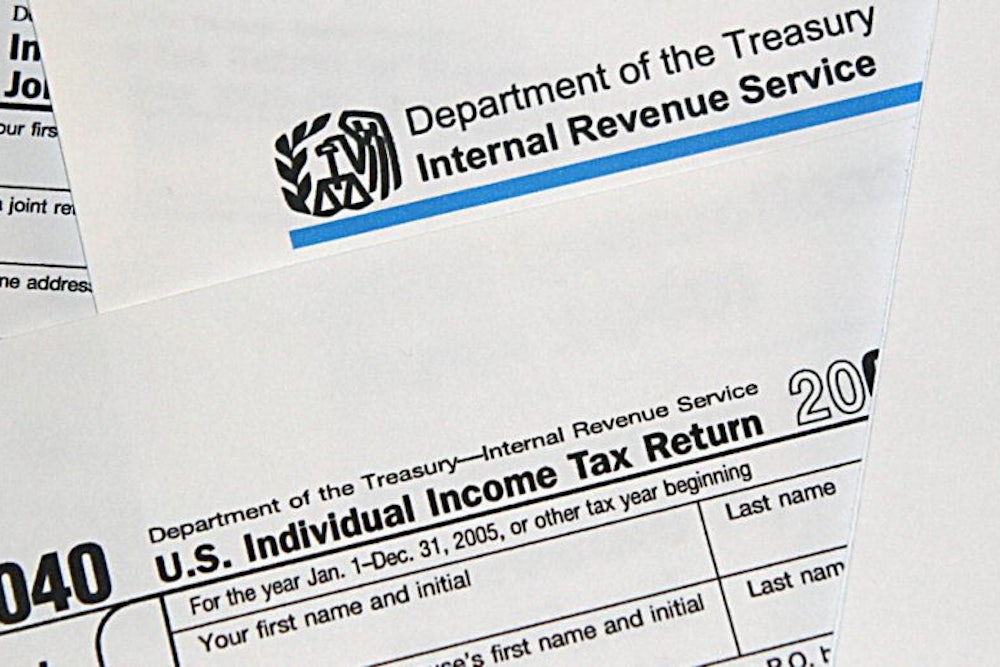Imagine for a moment: You work at an Internal Revenue Service back office in the Midwest. No, you are not in a posthumously published David Foster Wallace novel. You are in the Cincinnati office, which is charged with vetting applications for 501(c)(4) status, which allows groups not only to avoid paying any taxes on the money they collect but also to keep their donors secret. This status is intended for organizations that, unlike charity-focused 501(c)(3)’s, intend to engage in some advocacy or lobbying on a particular issue related to their mission. But under IRS rules, this advocacy must be for the general “social welfare”—and not geared toward political elections. Courts have granted some leeway in this regard, saying that groups are allowed to engage in some election activity as long as it is “insubstantial.” The IRS has allowed this gray area to expand to the point where groups must have a “primarily” social welfare mission, which many groups have happily taken to mean that elections can consume up to 49.999 percent of their resources.
You are in your cubicle in Cincinnati, and your office is suddenly swamped with a surge in applications—rising from 1,500 to 3,400 the past few years. This surge is driven by two factors. One is the series of court rulings, such as the Supreme Court’s Citizens United decision, that encourage political operatives to use 501(c)(4)’s as a way to funnel huge undisclosed donations into television ads, regardless of the IRS rules for the groups. The other is the swell in grassroots activism that is coming almost entirely from the right thanks to post-2008 tea party ferment.
This was the Cincinnati crew's situation the past couple years. And the real problem isn’t that it decided to deal with this deluge in applications by giving undue scrutiny to the second source of the stream. It’s that in doing so, it has given so little scrutiny to the first source.
Yes, the IRS employees in Cincinnati, looking for shortcuts to process the wave of applications, used conservative-themed catchwords to filter for groups that were perhaps too election-focused to merit 501(c)(4) status. But there is a plausible explanation for this: Most of the campaign-minded applications they were getting were conservative! This is a credit to the tea party movement, which for a while was generating levels of grassroots activism that the left could only envy. Why did the IRS not screen for “corporate greed” or “plutocracy” or “inequality”? Well, maybe because those words would have netted precious few applications to scrutinize.1
Not to mention that the applications from tea party groups demanded special attention for another reason: These groups were proudly political! Even if you take at face value the movement’s initial claim to be something all its own, something more than just the conservative wing of the Republican Party, its whole purpose from the get-go was to orient American politics and government toward its constitutional roots by intervening in elections at all levels, starting with Republican Party primaries. The tea party groups’ whole mission called their suitability for 501(c)(4) status into question.
The biggest problem with the Cincinnati office’s extra scrutiny of the groups was not that it was not justified, or not even that it would lead to predictable wails of manufactured outrage once it came out.2 It’s that it was a poor use of limited resources. At the same time it was sending long questionnaires to groups like a tea party outfit in Waco, the IRS was doing precious little to rein in the groups that were making a true mockery of the law on 501(c)(4)’s—outfits like Crossroads GPS, the organization co-founded by Karl Rove that spent $71 million last year. This spending was undeniably geared toward influencing the 2012 election but, unlike regular super PACs such as its sister group American Crossroads, Crossroads GPS was not required to disclose the source of the funds. All told, the 501(c)(4)’s spent $254 million in last year’s election, nearly three times what they spent in 2010. And yes, most of this spending was on behalf of the Republican side.
Which is to say that even as many small-fry conservative groups that were floating across the 501(c)(4) line found themselves getting hassled with time-consuming queries from Cincinnati, the great white sharks of the right floated on by, untouched. Now, Washington has flown into one of its predictable, oh-so-gratifying uproars about the clumsy attempts to regulate the little guys—Marco Rubio demands the head of the IRS (unfortunately, there isn't one), President Obama declares himself outraged, and the Beltway scorekeepers wonder if this outrage is sufficiently outrage-y. ("The question being asked in the political world today is whether [President Obama's] condemnations are too little, too late," declares one pundit.) Meanwhile, the odds that anything will be done to deal with the big guys—by, say, defining “insubstantial” investment in election activity to mean something far less than 49.999 percent—dwindle further, making the mockery of our laws a permanent condition. That is the real scandal.
Follow me on Twitter @AlecMacGillis
One already hears the cry: Ah, but if the Bush IRS had gone after left-wing groups, would liberals not cry murder? Some, but not all. Believe it or not, there are campaign-finance nerds who abhor rule-breaking regardless of the malefactor.
Something else overlooked in the outrage on the right is that the vetting of conservatives groups in some instances protects conservative donors. There are plenty examples of 501(c)(4) groups of dubious intent that raise money for political purposes but end up pocketing much of it for themselves.
